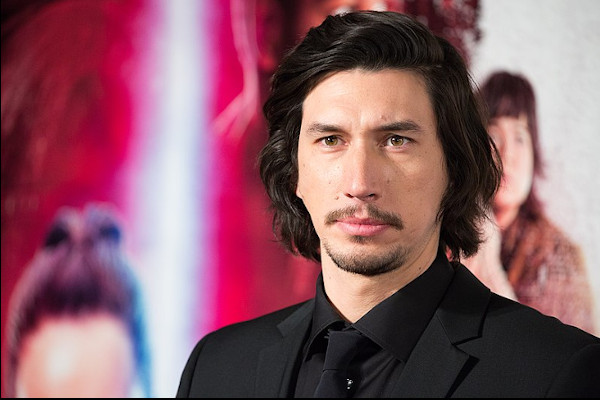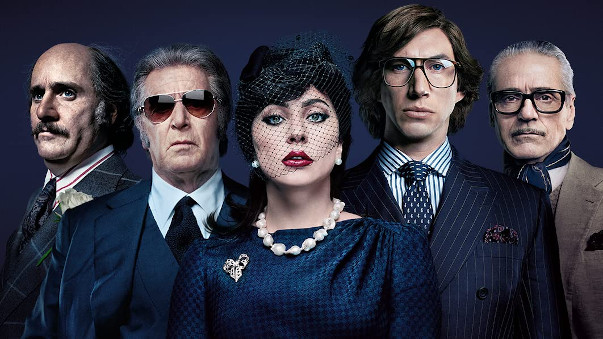Adam Driver: A Force to Be Reckoned With

Fresh-faced, cocky, and naively optimistic, Adam Driver left his hometown of Mishawaka, Indiana, with dreams of becoming a movie star at the age of 17. Within a week, he found himself broke and forced to move home. With his dreams shattered, Driver lost his sense of purpose, leaving him directionless.
Rejected from Juilliard and two months shy of 18, Driver witnessed the 9/11 terrorist attacks, leading him to join the Marine Corps. Filled with a sense of retribution, as well as self-hatred due to his failures, Driver discovered a sense of purpose through the people with whom he served. He served for 32 months before being honorably discharged due to a mountain biking accident fracturing his sternum. Driver then found himself back where he started, directionless.
To cope with his disappointment, Driver dove back into the performing arts. Through performing, he learned to articulate his experiences, emotions, and trauma from the line of duty. He reapplied and was granted admission into Juilliard. While studying, he and his fellow classmate and future wife, Joanne Tucker, co-founded Arts in The Armed Forces (AITAF) with the mission, “create space for meaningful dialogue, igniting connection and deepening our capacity for understanding around our common humanity.” Driver says that it was through acting and AITAF that he learned to put “words to feelings for the first time.” He said that he was “making the human connection of being in the military through theater, and in doing so [he] felt less alone.” Through this, Driver mastered an ability to contextualize his character’s emotions, while also showcasing their vulnerabilities.

Upon graduation, Driver began his acting career full-time. Working in New York City appearing in off-Broadway productions was where his talents as an actor became apparent. His performance in the play Slipping garnered praise with Andy Webster of The New York Times writing, “The strongest asset here[...] is Mr. Driver’s menacing portrait of Chris […] his simmering presence lends the story a palpable tension.” By 2011, Driver found himself working on Broadway with A-list actors such as Frank Langella. His performance, opposite Langella, in the production of Man and Boy earned him critical praise, with The Hollywood Reporter writing, “The actor conveys the agony of a self-doubting young man…craving the love of an overbearing patriarch.”
Upon being cast in Lena Dunham’s HBO series, Girls, Driver’s mainstream popularity grew. His performance as Adam Sackler, Dunham’s emotionally unstable boyfriend, made him a fan favorite with critics and audiences alike, earning him three Emmy nominations for Outstanding Supporting Actor in a Comedy Series.
Physically imposing at 6’3, Driver towered over Dunham (5’2), yet his size was never what made him intimidating. Rather, it was his ability to manipulate his partners and his bluntness that made him such a dominant force. Sackler highlighted Driver’s ability to blend vulnerability, intensity, and charisma. Sackler’s behavior was reprehensible. A struggling alcoholic and sexual abuser, Sackler often coerced women. Quotes such as, “You should never be anyone’s slave, except mine,” and “I don’t know how to behave without you. I’d die if you go away” demonstrate his character’s toxic codependency and ability to emotionally manipulate his partners, but they also showcase what made Sackler’s character so engrossing. The apparent comprehension of his flaws and failures and his ability to express himself honestly enamored audiences.
Driver’s fame skyrocketed upon the release of Star Wars: The Force Awakens in December 2015. His performance as Kylo Ren received widespread praise. He portrayed Kylo as unhinged and vulnerable, adding a newfound complexity to the franchise. Whether he was killing his father, struggling to kill his mother, standing up to his master, or berating his lieutenants, Driver’s performance evoked a sense of terror and unpredictability, thus creating an atmosphere of tension whenever he appeared on the screen.

Star Wars transformed Driver into an A-List leading man. Fans wondered what his next major role would be. Rumors even circulated that Zack Snyder cast Adam Driver to appear as Nightwing in Batman v. Superman: Dawn of Justice. Seemingly, every major studio had an interest in working with Driver post-Star Wars. Yet, Driver never went the studio franchise route, opting instead to place his focus elsewhere.
Outside the Star Wars sequel trilogy, Driver remains an independent actor. Driver focused on his craft and resume first and foremost. In the span of five years, he has worked with the likes of Jeff Nichols, Leos Carax, Steven Soderbergh, Spike Lee, Noah Baumbach, Ridley Scott, Terry Gilliam, and Martin Scorsese, who stated that Driver is “one of, if not the best, actors of his generation.” Working in a multitude of genres with world-renowned directors allowed Driver to build his resume and allure.
Driver’s success is predicated on his ability and willingness to portray emotionally vulnerable men. His career choices indicate his enjoyment of exploring the psychosis of flawed individuals. Take, for example, his Oscar-nominated performances in BlackkKlansman and Marriage Story. Spike Lee’s BlackkKlansman showcased Driver’s deadpan comedic timing, as well as his ability to subtly bring to life the character’s internal conflicts about racism. His character’s body language shifts from that of indifference to that of frustration as he witnesses racism and injustice.

Similarly, Noah Baumbach’s Marriage Story allowed Driver to display his comedic sensibilities, this time with a more kindhearted character in Charlie Barber. Opposite Scarlett Johansson, the two share palpable chemistry and deliver their dialogue with ease and comfort, despite their marriage being in ruins. Charlie struggles to express himself, feeling weighed down by the years of repressed resentment. He is a ticking time bomb. As the film progresses, his visual frustration grows ever more apparent, climaxing in a verbal assault where he wishes death upon his ex-wife. Upon release, Charlie is left horror-stricken by his words and breaks down, allowing them to engage in an open dialogue and accept their divorce.
Driver’s appeal is rooted in his ability to deconstruct his character’s masculinity. Take his three films released in 2021: The Last Duel, House of Gucci, and Annette. The characters he portrays in each amount to an odd yet satisfying “film trilogy” on toxic masculinity throughout modern history. Ridley Scott’s The Last Duel examines masculinity in early modern society through its chronicling of Marguerite de Carrogue’s rape in 1386 as perpetrated by Jacques Le Gris.
Driver portrays Le Gris, a knight who swears his love for Carrogue and insists the accusation is false. Le Gris fails to understand that the cultural misogyny he has been raised in causes him to exert power over women in a common, yet no less horrifying way: sexual aggression. As Driver explained in the Empire Film podcast, “Jacques Le Gris is someone who just takes things by entitlement.”

House of Gucci explores toxic masculinity in the contemporary era. Driver portrays Maurizio Gucci, former head of the Gucci fashion house. The film follows Maurizio and Patrizia Reggiani’s tumultuous relationship resulting in his murder in 1995. Driver portrays Maurizio as inept and passive. Sheltered in his upbringing, he allows others to dictate his personal life. Upon being named head of the Gucci household, he fails to run the company. Driver’s facial performance displays the tonal shift of Maurizio’s progression. At first, Maurizio is all smiles and laughs. Driver’s performance is breezy as if he were out of a romantic comedy. Yet, as his fame and wealth amass, Maurizio becomes stern and callous. He wears the Gucci name as a badge of honor but despite his fortunes, he struggles to gain respect. Driver’s performance mimics that of a sheep in wolf’s clothing. Power never fits him, causing Reggiani to take control.
If Driver’s 2021 releases were a trilogy, Leos Carax’s Annette would serve as its finale. A musical psychological drama, Annette explores toxic masculinity in the post-MeToo era. Here, Driver takes center stage, portraying Henry McHenry, a comedian whose routine consists of shock humor. His art is rooted in self-hatred, misogyny, and cynicism. He shares with the audience his humiliation and pain in an attempt to create an intimacy between himself and the crowd. His presentation is all in the name of comedy, yet it seemingly is an excuse for him to act out with no repercussions. He is not telling jokes as much as he is daring the audience to call him out on his erratic and inappropriate behavior. In being honest about everything, he is truthful about nothing.
Starring opposite Driver is Marion Cotillard as Ann Defrasnoux, a world-renowned opera singer who marries McHenry, resulting in media scrutiny. Ann’s talents as an artist are apparent, especially when juxtaposed to Henry’s mediocrity. As their story progresses, Henry’s self-hatred manifests as aggression, leading him to humiliate Ann both professionally and personally. Driver carries his performance with an unearned sense of bravado. His on-screen confidence and comfort give Henry an air of grandeur and self-absorption. In comparison to Cotillard’s classically trained singing voice (she won her Oscar for her portrayal of French singer Édith Piaf), Driver’s voice is amateurish. Yet, the composers allow Driver’s raspy baritone voice to overpower Cotillard’s voice. Driver’s self-conceited performance as Henry dominates Ann as a singer, despite his ineptitude and comparative lack of talent. His ego refuses to allow Ann to outperform him.

Henry’s abuse towards Ann worsens when six women come forward chronicling his history of abuse. All six of their testimonies detail his anger issues and violent tendencies. Their accounts are treated as revelations as the facade of Henry’s on-stage persona unravels. Audiences now view him as the monster he said he was the entire time.
In his first public appearance following the allegations, Driver depicts an egomaniac refusing to take accountability. His musical number, “You Used to Laugh” feels like a child throwing a tantrum, singing, “You think I care for what you wimps think of me now… It’s not my problem.” Wallowing in the public scrutiny empowers Henry to act tyrannically towards Ann. The musical number “My Star’s in Decline” allows Driver to utilize his height and size to mimic a literal monster come to life. Driver’s drunken appearance and unsteady movements cause destruction in his home, creating an effect like that of Godzilla leveling a city block. Here, he is at his most bitter, rageful, and terrifying. Driver emphasizes McHenry’s menace and jealousy towards Ann allowing us, the audience a window into the demons McHenry has been trying to conceal. With his actions that follow suit, Driver as McHenry solidifies himself as one of the year’s best villains and gives the audience insight into the mind of an egomaniac.
Through his numerous roles, Driver demonstrates a mastery over his emotions, and a willingness to portray himself unflatteringly. His performances are psychological deep dives into aspects of human nature that most try to conceal. By making space for honesty, Adam Driver succeeds in deepening our connection and understanding of our common humanity.
Author Bio:
Ben Friedman is a freelance film journalist and a contributing writer at Highbrow Magazine. For more of his reviews, visit bentothemovies.com, his podcast Ben and Bran See a Movie, or follow him on Instagram, Twitter, and YouTube: The Beniverse.
For Highbrow Magazine
Image Sources:
--Dick Thomas Johnson (Wikimedia, Creative Commons)



































































































































































































































































































































